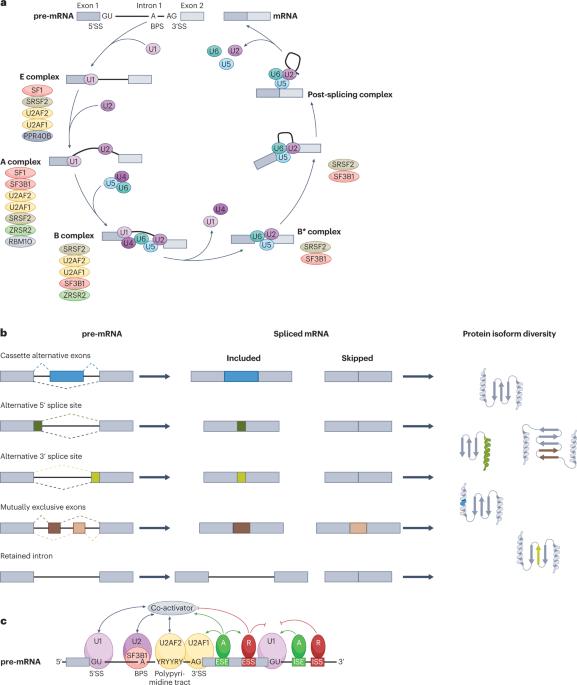RNA splicing dysregulation and the hallmarks of cancer
IF 72.5
1区 医学
Q1 ONCOLOGY
引用次数: 22
Abstract
Dysregulated RNA splicing is a molecular feature that characterizes almost all tumour types. Cancer-associated splicing alterations arise from both recurrent mutations and altered expression of trans-acting factors governing splicing catalysis and regulation. Cancer-associated splicing dysregulation can promote tumorigenesis via diverse mechanisms, contributing to increased cell proliferation, decreased apoptosis, enhanced migration and metastatic potential, resistance to chemotherapy and evasion of immune surveillance. Recent studies have identified specific cancer-associated isoforms that play critical roles in cancer cell transformation and growth and demonstrated the therapeutic benefits of correcting or otherwise antagonizing such cancer-associated mRNA isoforms. Clinical-grade small molecules that modulate or inhibit RNA splicing have similarly been developed as promising anticancer therapeutics. Here, we review splicing alterations characteristic of cancer cell transcriptomes, dysregulated splicing’s contributions to tumour initiation and progression, and existing and emerging approaches for targeting splicing for cancer therapy. Finally, we discuss the outstanding questions and challenges that must be addressed to translate these findings into the clinic. This Review discusses the diverse ways in which cancer-associated RNA splicing dysregulation promotes tumour initiation and progression, existing and emerging approaches for targeting splicing for cancer therapy and outstanding questions and challenges in the field.

RNA 剪接失调与癌症特征
RNA 剪接失调是几乎所有肿瘤类型的分子特征。癌症相关的剪接改变既来自复发性突变,也来自管理剪接催化和调控的反式作用因子的表达改变。癌症相关剪接失调可通过多种机制促进肿瘤发生,导致细胞增殖增加、凋亡减少、迁移和转移潜力增强、抗化疗和逃避免疫监视。最近的研究确定了在癌细胞转化和生长中发挥关键作用的特定癌症相关同工酶,并证明了纠正或以其他方式拮抗此类癌症相关 mRNA 同工酶的治疗效果。同样,调节或抑制 RNA 剪接的临床级小分子也已被开发为有前景的抗癌疗法。在此,我们回顾了癌细胞转录组特有的剪接改变、剪接失调对肿瘤发生和发展的影响,以及现有和新兴的靶向剪接治疗癌症的方法。最后,我们讨论了将这些发现转化为临床治疗所必须解决的悬而未决的问题和挑战。本综述讨论了癌症相关 RNA 剪接失调促进肿瘤发生和发展的各种方式、针对剪接治疗癌症的现有和新兴方法以及该领域的未决问题和挑战。
本文章由计算机程序翻译,如有差异,请以英文原文为准。
求助全文
约1分钟内获得全文
求助全文
来源期刊

Nature Reviews Cancer
医学-肿瘤学
CiteScore
111.90
自引率
0.40%
发文量
97
审稿时长
6-12 weeks
期刊介绍:
Nature Reviews Cancer, a part of the Nature Reviews portfolio of journals, aims to be the premier source of reviews and commentaries for the scientific communities it serves. The correct abbreviation for abstracting and indexing purposes is Nat. Rev. Cancer. The international standard serial numbers (ISSN) for Nature Reviews Cancer are 1474-175X (print) and 1474-1768 (online). Unlike other journals, Nature Reviews Cancer does not have an external editorial board. Instead, all editorial decisions are made by a team of full-time professional editors who are PhD-level scientists. The journal publishes Research Highlights, Comments, Reviews, and Perspectives relevant to cancer researchers, ensuring that the articles reach the widest possible audience due to their broad scope.
 求助内容:
求助内容: 应助结果提醒方式:
应助结果提醒方式:


